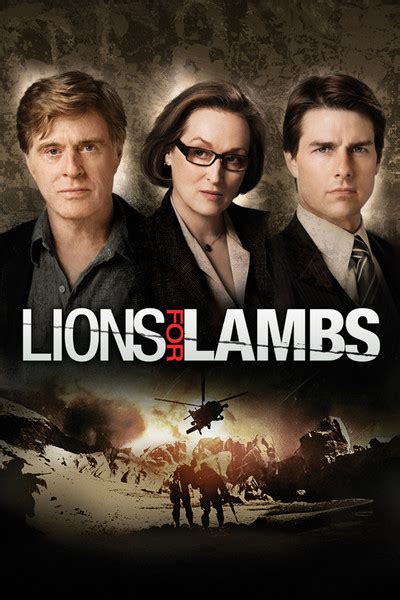The complexities of war and the decisions that lead to its consequences are at the heart of the 2007 film “Lions for Lambs,” directed by Robert Redford. This movie delves into the intersecting storylines of a politician, a professor, and two soldiers, weaving a narrative that critiques the Bush administration’s handling of the War on Terror, especially the invasion of Afghanistan. “Lions for Lambs” is not just a film about war; it’s an exploration of responsibility, sacrifice, and the chasm between political rhetoric and the harsh realities on the ground.
At the core of the film is Senator Jasper Irving (played by Tom Cruise), a charismatic and ambitious politician who has just launched a new military strategy in Afghanistan. He attempts to convince a skeptical journalist, Janine Roth (Meryl Streep), of the merits of his plan, which he believes will turn the tide of the war. Meanwhile, Professor Stephen Malley (Robert Redford) tries to inspire his apathetic student, Todd Hayes (Andrew Garfield), by relating the story of two former students, Ernest Rodriguez (Michael Peña) and Arian Finch (Derek Luke), who enlisted in the army partly due to his influence.
The film flips between these narratives, contrasting the comfort and detachment of political maneuvering with the stark, life-or-death situations faced by soldiers on the battlefield. As the story unfolds, it becomes clear that the invasion of Afghanistan, justified as part of the War on Terror, has led to a series of tragic events for the characters involved. The title “Lions for Lambs” refers to the historical strategy of using brave warriors (lions) as cannon fodder for inept leaders (lambs), highlighting the sacrifice of young soldiers for the ambitions of their commanders.
One of the strengths of “Lions for Lambs” is its attempt to challenge the viewer’s perceptions about the reasons behind going to war and the consequences of such actions. It questions the Gap between the strategies devised in comfortable, removed offices and the stark realities faced on the ground. The film also touches on the theme of responsibility, both at a personal level, as seen in the relationship between Professor Malley and his students, and at a societal level, where the broader implications of political decisions are considered.
However, the film received mixed reviews, with some critics praising its ambition and others finding it overly preachy or divided in its focus. The narrative structure, which jumps between different storylines, can feel disjointed at times, and the characters’ arcs, while well-intentioned, sometimes struggle to resonate deeply due to the film’s broad scope.
Despite its flaws, “Lions for Lambs” remains a thought-provoking commentary on the state of American politics and society in the early 21st century. It reflects on the concept of patriotism, not just as blind loyalty to one’s country, but as a critical engagement with its policies and the willingness to question authority. The film challenges viewers to consider their role in the democratic process and the importance of informed, active citizenship in preventing the misuse of power.
In conclusion, “Lions for Lambs” is a complex, visually engaging, and intellectually stimulating film that challenges its audience to reflect on the consequences of political actions. While it may not fully succeed in balancing its multiple narrative threads or in providing character development that resonates with all viewers, its message about responsibility, both personal and societal, and the need for a critical, engaged populace remains timely and relevant.
Analyzing the Impact
- Historical Context: Understanding the film within the context of the War on Terror and the invasion of Afghanistan provides deeper insights into its themes and messages.
- Character Dynamics: The relationships between characters, particularly the contrasts between the politician, the professor, and the soldiers, underscore the film’s exploration of responsibility and sacrifice.
- Political Commentary: As a critique of political decisions and their consequences, “Lions for Lambs” encourages viewers to engage critically with political rhetoric and actions.
FAQs
What is the main theme of “Lions for Lambs”?
+The main theme of “Lions for Lambs” revolves around the critique of political decisions, especially concerning the War on Terror, and the exploration of responsibility, sacrifice, and the disconnect between political strategies and their real-world consequences.
How does the film portray the relationship between politicians and soldiers?
+The film portrays this relationship as one of stark contrast, where politicians in positions of power make decisions that directly affect the lives of soldiers, often without fully understanding or acknowledging the risks and realities of those decisions.
What message does “Lions for Lambs” convey about patriotism and citizenship?
+The film suggests that true patriotism involves not just loyalty to one’s country but also a critical engagement with its policies and a willingness to question authority, emphasizing the importance of informed and active citizenship.



